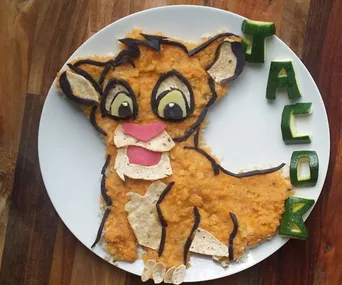Watch this video to see how this clever dad encourages his son Logan to eat his morning cereal by inviting a three-foot long rhinoceros iguana named Buddy to join him at the breakfast table.
Some parents are so anxious to ensure their children are getting a decent diet that they resort to all sorts of tricks and tactics to make them eat.
As cute as this may seem, iguanas such as Buddy should normally have a diet of leaves, flowers, fruit and vegetables, and we’re not too sure about the amount of added sugar in the cerealKix, but if you were going to go to this length to encourage your child to eat, Buddy could have at least lead by example and encouraged Logan to eat a more nutritious breakfast. Thankfully they are eating Kixandbananas.
If you are having trouble trying to convince your toddler to eat well, read on for some helpful hints.
Top ten tips
Get her to help prepare her own meals. Two- and three-year-olds love making a mess with food and if you let them fool around with their food before their meal, they are less likely to do so during it.
If your child throws a tantrum at the table, try not to focus on it too much. Make less eye contact with her and divert your attention elsewhere.
Don’t fill her up with drinks and snacks instead of meals. Plenty of water between meals is healthy, but litres of sugary drinks are not (and they’ll leave her feeling too full to eat).
Don’t try to get your child to eat when he’s over-tired.
If they refuses to eat, end the meal don’t make her sit there for hours.
Don’t rush meals, allow children who are slow eaters plenty of time to finish.
Offer fussy eaters a good variety of colours and textures on their plate this can make food seem more tempting and interesting.
If your child rejects something once, don’t be afraid to offer it again, and again. Tastes change quickly, sometimes even daily.
If they don’t eat their meal, don’t give them an after-meal treat.
Above all, try to make mealtimes fun. Whether or not your child eats, it’s still a great opportunity to have a good chat and enjoy each other’s company. Just ease off and give her a little space and time, and see how they progresses. Even if they don’t eat anything today or tomorrow, they probably will next week.
Further food worries sorted
Are they getting the enough vitamins and minerals?
The good news is that your worries are probably unnecessary; research shows that parents underestimate the amount their toddlers eat. Although the quantity of food your child consumes may seem tiny to you, remember that an 18-month-old child only requires about half the calories needed by an adult, and it’s normal for toddlers to eat a little on some days and more on others. What is important is that the food you give them should be of some nutritional value, so even if your child insists on living on toast one week and grapes the next, there’s evidence that, left to their own devices, they will eat a balanced diet in the long term.
They won’t eat
The best way of dealing with a toddler on virtual hunger strike is to stop fighting about food. All the things we’re tempted to do, like wheedle, cajole or lose our tempers, will probably only make them more determined not to touch their food. It can be difficult to keep your cool when the meal you’ve spent ages preparing sails past your head after only two mouthfuls, but staying calm really will help.
They get distracted at mealtimes and takes forever to eat
Studies show that family mealtimes are becoming a thing of the past, with more and more of us eating on the run or staggering meals to suit everyone’s busy schedules. But toddlers need structured mealtimes so that they can get used the idea that, at certain times of day, they should sit in a certain place and eat a meal.
Watching members of the family eating at mealtimes will help develop their use of utensils andshowthem what table behaviour is expected from them.
One day they love it, the next they don’t
You’ve made a huge plate of veggie risotto, crammed with spinach and peas, a sense of pride and relief appears on your face as you watch the entire plate being devoured. Don’t get too excited, they were probably just really hungry. Getting them to work up an appetite before meals can make a big difference.


